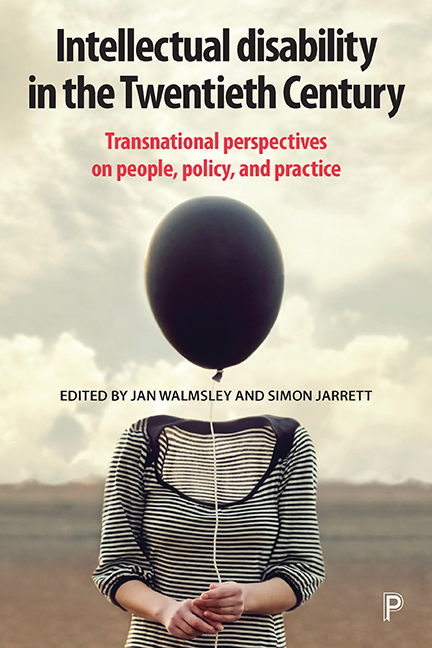 Intellectual Disability in the Twentieth Century
Intellectual Disability in the Twentieth Century Book contents
- Frontmatter
- Contents
- Notes on editors and contributors
- Introduction
- one Paradoxical lives: intellectual disability policy and practice in twentieth-century Australia
- two Tracing the historical and ideological roots of services for people with intellectual disabilities in Austria
- three Time of paradoxes: what the twentieth century was like for people with intellectual disabilities living in Czechoslovakia/Czech Republic
- four Intellectual disability in twentieth-century Ghana
- five A Greek Neverland: the history of the Leros asylums’ inmates with intellectual disability (1958–95)
- six Intellectual disability in Hong Kong: then and now
- seven People with intellectual disabilities in the European semi-periphery: the case of Hungary
- eight People with intellectual disabilities in Iceland in the twentieth century: sterilisation, social role valorisation and ‘normal life’
- nine Institutionalisation in twentieth-century New Zealand
- ten ‘My life in the institution’ and ‘My life in the community’: policies and practice in Taiwan
- eleven Intellectual disability policy and practice in twentieth-century United Kingdom
- twelve From social menace to unfulfilled promise: the evolution of policy and practice towards people with intellectual disabilities in the United States
- Index
twelve - From social menace to unfulfilled promise: the evolution of policy and practice towards people with intellectual disabilities in the United States
Published online by Cambridge University Press: 27 April 2022
- Frontmatter
- Contents
- Notes on editors and contributors
- Introduction
- one Paradoxical lives: intellectual disability policy and practice in twentieth-century Australia
- two Tracing the historical and ideological roots of services for people with intellectual disabilities in Austria
- three Time of paradoxes: what the twentieth century was like for people with intellectual disabilities living in Czechoslovakia/Czech Republic
- four Intellectual disability in twentieth-century Ghana
- five A Greek Neverland: the history of the Leros asylums’ inmates with intellectual disability (1958–95)
- six Intellectual disability in Hong Kong: then and now
- seven People with intellectual disabilities in the European semi-periphery: the case of Hungary
- eight People with intellectual disabilities in Iceland in the twentieth century: sterilisation, social role valorisation and ‘normal life’
- nine Institutionalisation in twentieth-century New Zealand
- ten ‘My life in the institution’ and ‘My life in the community’: policies and practice in Taiwan
- eleven Intellectual disability policy and practice in twentieth-century United Kingdom
- twelve From social menace to unfulfilled promise: the evolution of policy and practice towards people with intellectual disabilities in the United States
- Index
Summary
Centuries (as well as decades and years) are malleable demarcations of time. Held to a literal calendar, the 100-year periods are rigid divisions, changing over on the ‘double zero’ years. Yet most people experience centuries as eras organised around key events, dramatic discoveries or major social and economic shifts. Also implied with this constructivist approach to the periodisation of history is that centuries differ from group to group, from setting to setting. Sometimes we recognise these beginnings and endings in the moment. Most Americans, I would argue, think of the twenty-first century as beginning not on 1 January 2000, but on 11 September 2001, with the indelible images of planes flying into the World Trade Center in New York City. That is when and how we came to think of our place in the world, both individually and as a nation, in radically different ways. Many historians would agree that the founding fathers of America (George Washington, Thomas Jefferson and so on) knew at the time of their actions in declaring independence from England, that it was the beginning of a radically new era. To give any coherence to an overview of the nineteenth century in the United States, then, you almost have to have it begin in 1789 or even 1776, rather than the calendar date of 1800. However, sometimes these century markers are known only with hindsight and remain open to dispute. The evolution of events gains temporal meaning only in retrospect, with some groups finding importance in one key event, while others find significance in another.
This chapter uses contemporaneous accounts and retrospective interpretations to argue that the history of intellectual disability in the USA in the twentieth century can be experientially understood to run from around 1908 to around 1999. These dates reflect the introduction and rapid spread of the Binet intelligence test at the beginning (Zenderland, 1998) and the landmark Supreme Court case, Olmstead v. L.C., 527 U.S. 581 (1999), establishing a right to community-based living (with some key deference given to professional judgement) for individuals with intellectual disabilities at the end. A further division into three separate eras can help to shape our understanding of how circumstances in the USA for individuals with intellectual disabilities have simultaneously undergone dramatic change and remained frustratingly the same.
- Type
- Chapter
- Information
- Intellectual Disability in the Twentieth CenturyTransnational Perspectives on People, Policy, and Practice, pp. 195 - 206Publisher: Bristol University PressPrint publication year: 2019


